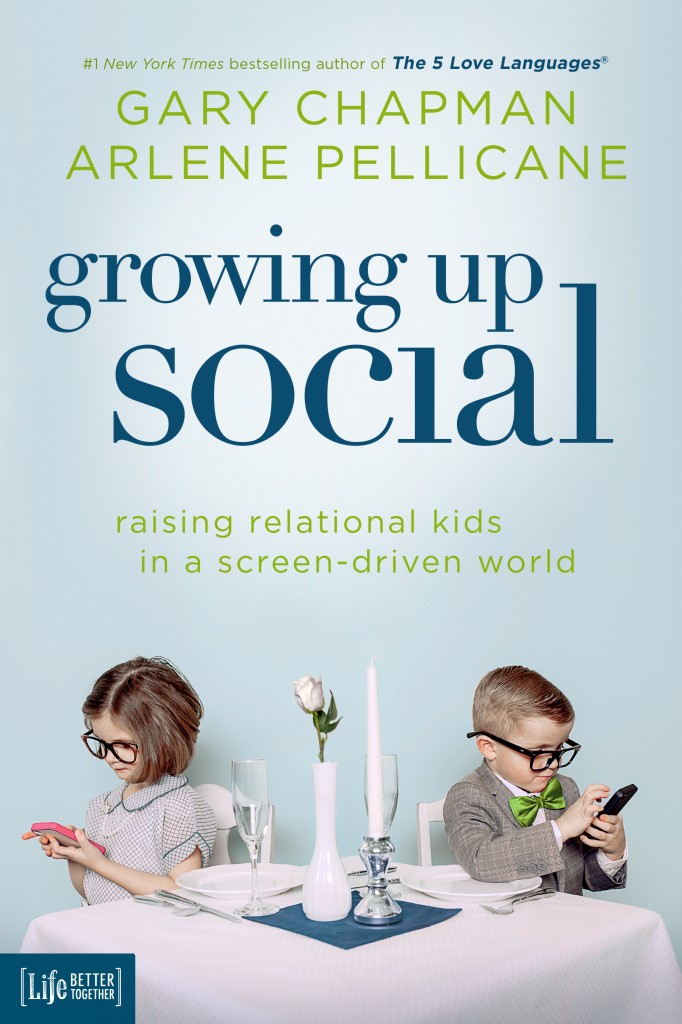 Today, we have a treat for you! A giveaway of GARY CHAPMAN’s and ARLENE PELLICANE’s new book, GROWING UP SOCIAL!
Today, we have a treat for you! A giveaway of GARY CHAPMAN’s and ARLENE PELLICANE’s new book, GROWING UP SOCIAL!
Arlene is a guest who has shared here at The M.O.M. Initiative several times and I love her heart to minister to women! Today’s post is an adaptation from Growing Up Social and Arlene has graciously offered to give away a copy!
SOOOOO… be sure to leave a comment for a chance to win. Winner will be announced in Sunday’s post.
– – – – – – – – – – – – – – – – – – – – – – – – – – – – – – – – – – – – – – – – – – – – – – – –
Is technology bringing your family closer together or is it driving it further apart?
Joseph and Amanda have three children, ages 2, 6 and 10. Their kids play video games and watch movies and television all day except for the time the older kids are in school. Joseph and Amanda are very concerned about the amount of time their children spend in front of screens. Yet they feel helpless and powerless to make a change.
“We have no guidelines,” said Joseph. “We did have guidelines, but could not keep them in place.”
Can you identify with these discouraged parents? You’ve tried to limit screen time in the past but the temper tantrums were too much to bear. I have heard from hundreds of parents who’ve expressed their frustration with implementing digital guidelines.
“We have no rules and our kids watch a lot of TV and play video games.”
“Screen time rules aren’t stated; they’re implied and it’s not working.”
“I regret not having guidelines because my son missed out on socializing with people face to face. He’s in his twenties and completely engrossed with being on his computer.”
Someday when your child becomes an adult, you want her to have all the skills necessary to succeed in her relationships. The training necessary for growing up social isn’t found on a phone or tablet. There’s no app or video game that can replace interactions with other human beings. Social skills must be practiced in real life, beginning for a child in the home.
Having a social child means that your son or daughter will be able to talk to people and like people. He’ll be able to relate to others around him and enjoy activities with friends and family members. Being social isn’t just about making small talk in the cafeteria. It involves showing other people you care through eye contact, conversation, and empathy. The ideal place for a child to learn to be social is in his home, where a loving mother or father can model what healthy relationships look like.
Unfortunately, there is a subtle shift happening in many homes that is profoundly eroding the relationship between parent and child. The average American child and teenager spends 53 hours a week with media and technology, far more time in front of screens than interacting with parents or people. How is a growing child supposed to learn about getting along with others when the vast majority of her time is spent with a screen?
In its defense, technology does enable a family to connect in some pretty amazing ways. Think of a Skype call with grandma across the miles or a laptop which enables a parent to work from home. Yet more often than not, technology divides a family. Instead of gathering around one television to watch a movie and eat popcorn (isn’t that what the advertisement for the big screen promised?), dad is watching sports on the big screen while mom is checking Facebook on her computer. The kids are playing video games on their tablets. Each family member is in a different room or space with their gadget. As author and MIT professor Sherry Turkle writes, they are “alone together.”
It takes conscious effort to use technology to connect, not disconnect, with your family members. Here’s a video that shows a day-in-the-life of an average family. It happens to be my family, but I think you will see a little bit of your family in it too.
If you can’t view the video in your reader, please click the link – https://www.youtube.com/watch?v=A-ANoYvKA1k
I know it’s your heart to be connected to your kids. That’s why you’re here. You can begin with an honest inspection of how you use screen time in your own life and with your children. If we are constantly checking and using phones and tablets in the presence of our kids, they will learn to do the same. But…if we can limit our screen time and connect face-to-face each day with our children, they will learn those valuable relational skills that will serve them for a lifetime.
DON’T FORGET TO COMMENT FOR A CHANCE TO WIN A COPY OF GROWING UP SOCIAL!
###
Adapted from Growing Up Social: Raising Relational Kids in a Screen-Driven World by Arlene Pellicane and Gary Chapman.
 Arlene Pellicane is a speaker and author of 31 Days to Becoming a Happy Wife. She has been featured on the Today Show, Family Life Today, K-LOVE, and The Better Show. She lives in San Diego with her husband James and three children. Visit Arlene at www.ArlenePellicane.com for free family resources including a monthly Happy Home podcast.
Arlene Pellicane is a speaker and author of 31 Days to Becoming a Happy Wife. She has been featured on the Today Show, Family Life Today, K-LOVE, and The Better Show. She lives in San Diego with her husband James and three children. Visit Arlene at www.ArlenePellicane.com for free family resources including a monthly Happy Home podcast.
As anyone who has attended one of his marriage conferences knows, Dr. Gary Chapman’s expertise in marriage begins with the success and failures he and his wife Karolyn have experienced in their marriage for more than 45 years. He is just the man to turn to for help on improving or healing our most important relationships. His own life experiences, plus over thirty-five years of pastoring and marriage counseling, led him to publish his first book in the Love Language series, The Five Love Languages: How to Express Heartfelt Commitment to Your Mate. Many of the millions of readers credit this continual New York Times bestseller with saving their marriages by showing them simple and practical ways to communicate love.
Since the success of his first book, Dr. Chapman has expanded his Five Love Languages series with special editions that reach out specifically to singles, men, and parents of teens and young children.
He is the author of numerous other books published by Moody Publishers/Northfield Publishing, including Anger, The Family You’ve Always Wanted, The Marriage You’ve Always Wanted, Desperate Marriages, God Speaks Your Love Language, How to Really Love Your Adult Child, and Hope for the Separated. With Dr. Jennifer Thomas, he co-authored The Five Languages of Apology.
Dr. Chapman speaks to thousands of couples nationwide through his weekend marriage conferences. He hosts a nationally syndicated radio program, A Love Language Minute, and a Saturday morning program, Building Relationships with Dr. Gary Chapman, both airing on more than 400 stations. Dr. Chapman and his wife have two grown children and currently live in Winston-Salem, North Carolina, where he serves as senior associate pastor at Calvary Baptist Church.
Dr. Chapman holds BA and MA degrees in anthropology from Wheaton College and Wake Forest University, respectively, MRE and PhD degrees from Southwestern Baptist Theological Seminary, and has completed postgraduate work at the University of North Carolina and Duke University.
CLICK HERE to request to join our FACEBOOK GROUP and CONTINUE the CONVERSATION!
- Ch…ch…ch…CHANGES Are Coming in 2017 for TMI - December 27, 2016
- What New Thing Are You Ready to See God Do in Your Life in 2017? - December 26, 2016
- Heaviness and Newness - December 23, 2016



